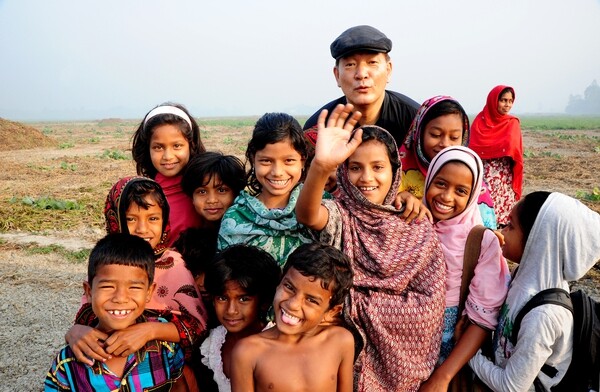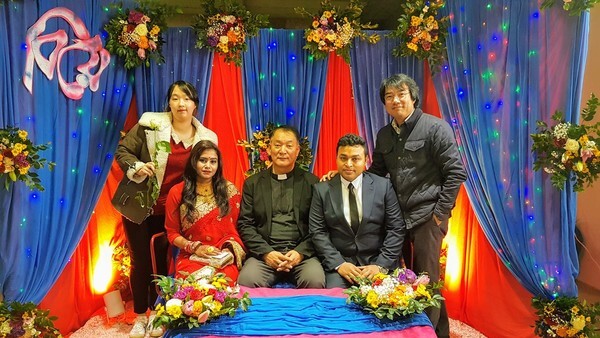hankyoreh
Links to other country sites 다른 나라 사이트 링크
[Interview] Anglican minister awarded Order of Civil Merit for service to migrant workers

When newly ordained Anglican minister Lee Jeong-ho, now 60, first crossed Machi Ridge in Namyangju, Gyeonggi Province, and entered the village of Maseok in June 1990, it was still a place for people with Hansen’s disease. Ostracized patients and their family members had gathered there to create their own village, where they raised pigs and chickens. At some point, more and more people from Southeast Asia began showing up. When Lee asked who they were, he was told they had “come to make money.” They were employees of a factory that had rented a chicken farm and brought in machinery to make furniture. So it was that other victims of discrimination took up residence next to victims of ostracism.
Maseok Furniture Complex had around 2,000 migrant workers around the time the Asian financial crisis hit in 1998. The employment permit system had not yet been introduced; the industrial trainee system was still in effect, and most of the workers were undocumented. The state defines international residents without visas as “illegal sojourners.” In those days, it was still routine for South Korean bosses to beat migrant workers, insult them, and siphon off their wages.
Father Lee’s job was to stop the violence at the complex and claim the unpaid money. The Namyangju Foreigner Welfare Center, where Lee serves as director, was also responsible for going to the Office of Immigration to have temporary custody lifted for migrant woman who had left a child alone at the complex when she was arrested in a crackdown and faced with deportation.
For 27 years, Lee has been a friend, guardian, and keeper of order for migrant workers at the complex. On Dec. 8, he was recognized for his service with an Order of Civil Merit, Camellia Medal, at the 2017 Republic of Korea Human Rights Awards, held at the Seoul Central Government Complex annex on the 69th anniversary of the Universal Declaration of Human Rights.
“I did it because I believe in Jesus Christ, and because I am a priest,” Lee said in a telephone interview on Dec. 12. “Jesus teaches us to help those who are weary, who have nothing, who are lacking and thwarted and suffering.”
“The term ‘migrant’ does not appear anywhere in the Moon Jae-in administration’s 100 chief governance tasks,” he added.
“I hope this will be an occasion for recognizing migrants as part of South Korean society and giving courage to migrant workers in Maseok and other places.”
Thousands of people have visited the Namyang Foreigner Welfare Center over the years to have a cup of coffee and talk about solutions for the difficulty of their work or the sad plights of ailing coworkers. Roger, who worked at the complex for 24 years without a visa before returning home in 2015 to the island of Mindoro in the Philippines, worked with the center in ministering to the local Filipino community. Mahiya, a “girl without a country” born to undocumented migrant worker parents at an OB/GYN clinic in Seoul’s Mangu neighborhood, was one of the children entrusted to the center’s day care facility. Obtaining citizenship was never an option for Mahiya, who in 2013 left for her parents’ home country of Bangladesh.

Respecting people of all religions
Despite being an Anglican priest, Lee has never stayed within rigid religious lines, mingling freely with the majority-Muslim workers at the complex. When a Bangladeshi named Zakaria died from an incurable disease, he organized a funeral and prayed alongside a Muslim imam. He gave the baptismal name of Abraham to a Nepalese Buddhist worker named Ram who asked to be baptized as a Catholic after contracting terminal cancer while working at one of the complex’s factories injecting argon gas into fluorescent lights.
“In 27 years of pastoral work, I’ve never once converted one [follower of Islam] into a follower of Christ,” he laughed.
“I’ve never asked a follower of Islam to believe in Jesus. Religion must be interpreted in the sense of coexistence,” he said.
Lee believes South Korea will become more inclusive with its migrant policies as it enters an era of a hyper-aging society and over 2 million migrant workers. His suggestion is to follow the lead of other advanced economies by granting legal sojourn rights to those who have lived here for many years without incident.
“It’s time for us now as a society to think about the traumas migrant workers have experienced after returning home from South Korea. It breaks my heart to hear the things people say after experiencing life here,” he said.
“I’ve heard so many people tell me, ‘I acquired this or that disability in South Korea,’ ‘They took my housing deposit and I never got it back,’ or ‘I never received severance pay,’ he lamented.”
A country in need of migrant workers
“South Korea is going to need migrants in an era of hyper-aging and a low birth rate,” added Lee. “It’s time for us to think about the people who are going to arrive in South Korea with negative views in the future [after hearing about other migrants’ negative experiences].”
Lee is planning to travel to Bangladesh on Jan. 9 to attend the second annual “Young People Talking about Multiculturalism” program. He and a group of around 40, including 25 young people, will be visiting Louhajong in Dhaka’s Munshiganj district – home to a number of migrant workers formerly with the complex – for exchange activities and a garbage bin distribution effort. Separating trash is still a largely foreign concept in Bangladesh. Lee is already excited about his plan for using the 2 million won (US$1,840) in prize money that he received with his medal to buy lunches for poor residents.
Not long ago, Lee left a Facebook message quoting Leviticus 19:33–34: “And if a stranger sojourn with thee in your land, ye shall not vex him. But the stranger that dwelleth with you shall be unto you as one born among you, and thou shalt love him as thyself.”
By Jeon Jong-hwi, staff reporter
Please direct questions or comments to [english@hani.co.kr]

Editorial・opinion
![[Guest essay] The real reason Korea’s new right wants to dub Rhee a founding father [Guest essay] The real reason Korea’s new right wants to dub Rhee a founding father](https://flexible.img.hani.co.kr/flexible/normal/500/300/imgdb/original/2024/0423/8317138574257878.jpg) [Guest essay] The real reason Korea’s new right wants to dub Rhee a founding father
[Guest essay] The real reason Korea’s new right wants to dub Rhee a founding father![[Column] ‘Choson’: Is it time we start referring to N. Korea in its own terms? [Column] ‘Choson’: Is it time we start referring to N. Korea in its own terms?](https://flexible.img.hani.co.kr/flexible/normal/500/300/imgdb/original/2024/0423/3617138579390322.jpg) [Column] ‘Choson’: Is it time we start referring to N. Korea in its own terms?
[Column] ‘Choson’: Is it time we start referring to N. Korea in its own terms?- [Editorial] Japan’s rewriting of history with Korea has gone too far
- [Column] The president’s questionable capacity for dialogue
- [Column] Are chaebol firms just pizza pies for families to divvy up as they please?
- [Column] Has Korea, too, crossed the Rubicon on China?
- [Correspondent’s column] In Japan’s alliance with US, echoes of its past alliances with UK
- [Editorial] Does Yoon think the Korean public is wrong?
- [Editorial] As it bolsters its alliance with US, Japan must be accountable for past
- [Guest essay] Amending the Constitution is Yoon’s key to leaving office in public’s good graces
Most viewed articles
- 1[Column] ‘Choson’: Is it time we start referring to N. Korea in its own terms?
- 2Senior doctors cut hours, prepare to resign as government refuses to scrap medical reform plan
- 3[Guest essay] The real reason Korea’s new right wants to dub Rhee a founding father
- 4Why Korea shouldn’t welcome Japan’s newly beefed up defense cooperation with US
- 5[Column] The clock is ticking for Korea’s first lady
- 6Opposition calls Yoon’s chief of staff appointment a ‘slap in the face’
- 7New AI-based translation tools make their way into everyday life in Korea
- 8Terry Anderson, AP reporter who informed world of massacre in Gwangju, dies at 76
- 9Korean government’s compromise plan for medical reform swiftly rejected by doctors
- 10[Editorial] Japan’s rewriting of history with Korea has gone too far